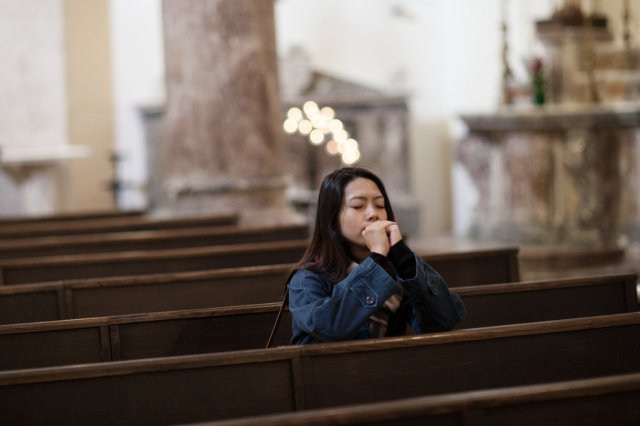
“Gratitude is the truest approach to life. We did not create or fashion ourselves. We did not birth ourselves. Life is about giving, receiving, and repaying. We are receptive beings, dependent on the help of others, on their gifts and kindness.”
Millions of people in the UK say they pray, according to new ComRes research for Tearfund which found that half of the people surveyed said they “ever” pray (51%) and one in five (20%) say they pray at least once a month. One of the biggest reasons for praying is thankfulness: 42% of people who said they prayed use their prayers for thanking God.
Gratitude is a common theme in most religions, and sacred texts frequently urge worshippers to give thanks. The Koran, the Bible, and the Hebrew Scriptures, among others, routinely invoke gratitude.
The rationale, though, is often complex. It’s usual for religious people to be encouraged to be grateful as a straightforward recognition of God’s power, as in the New Testament used by Christians. “Every good and perfect gift is from above, coming from the Father of the heavenly lights” is stated in James 1:17 (NIV translation).
And the Hebrew Scriptures, shared by Jews and Christians, bring together gratitude and lament in books like the Psalms to demonstrate the presence of both simultaneously. Psalmists often describe their torment, loneliness and persecution and turn towards declarations of gratitude as an act of will, choosing to give praise during the suffering, attributing to God any comfort found during their ordeal. Psalm 30, verse 11, for example:
“You turn my wailing into dancing; you remove my sackcloth and clothed me with joy, that my heart may sing your praises and not be silent. Lord my God, I will praise you for ever.”
But there is also an incentivisation in many religious traditions: directing gratitude towards God will bring greater blessing.
The Muslim writings say “if you are grateful, I will give you more” (Sura 14:7) and the Bible promises (2 Corinthians 9:11) that ‘you will be enriched in every way so that you can be generous on every occasion, and through us your generosity will result in greater gratitude to God.”
It’s a teaching which can be used to encourage worshippers to give money, out of gratitude. Just last week, US Presidential adviser and TV preacher Paula White, who prayed at Trump’s inauguration, encouraged people to send her their January salary as a ‘firstfruits’ offering, suggesting that good things would come their way this year if they did so.
But the desire to give thanks is not confined to religious people. As our opening quote above demonstrates – it’s a comment by US psychologist Robert Emmons in a piece in The Atlantic about gratitude – it’s possible to express thankfulness without reference to a deity or to an immaterial world.
Psychologists insist that an attitude of gratitude contributes to emotional health in seven “proven” ways and well-being and, in the West at least, where more people are identifying as No Religion than ever before, thankfulness appears to be considered a universal value as much as a religious act of devotion. But it still appears high up lists like the one in Tearfund’s survey. Not everyone has lost the desire to thank an immaterial ‘other’.
Who is doing the praying?
- More women than men: Tearfund’s survey found that women in the UK are more likely to say they ever pray than men (56% versus 46% respectively). This is consistent with global research conducted by Pew Research Center who found, when comparing rates of daily prayer, that Israel was the only country where men were more likely to say they prayed daily than women were.
- Non-religious people are joining in: According to the ComRes survey commissioned by Tearfund, among people in the UK who have no religious affiliation but say that they have ever prayed, the most common reason for doing so is personal crisis or tragedy (55%). While we don’t know what those people mean by praying, or who they would consider themselves to be praying to, this suggests that there is something which people are doing, perhaps in the middle of the night when everything feels intolerable, to ‘give away’ their pain and grief to someone or something.










Join the discussion
Join like minded readers that support our journalism by becoming a paid subscriber
To join the discussion in the comments, become a paid subscriber.
Join like minded readers that support our journalism, read unlimited articles and enjoy other subscriber-only benefits.
Subscribe